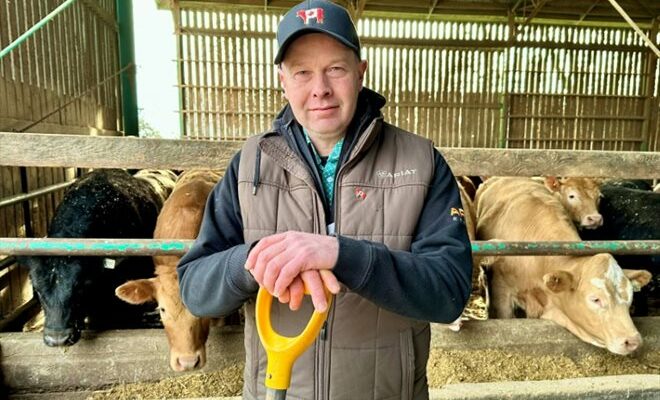On a cattle farm in Saint-Anicet in Canada, March 22, 2024 (AFP/Geneviève NORMAND)
On Canadian farms, we look with caution at the non-ratification by the French Senate of the free trade agreement between the European Union and Canada last week, because on this side of the Atlantic experts explain that the agreement mainly benefits Europeans.
Following its approval by the European Parliament in early 2017, this agreement – Ceta – has already been applied provisionally since September of the same year.
An agreement that is the subject of many “fantasies” in Europe
For Geneviève Dufour, an expert in international trade law at the University of Ottawa, there continue to be a lot of “fantasies” in the European vision of Canadian agriculture.
“We often hear about beef with hormones, genetically modified organisms…” But “in reality, that’s not exactly what’s happening.” “The French can decide not to import certain products, that’s what they do,” she explains.
Because in practice, no goods banned in Europe pass the customs barrier, due to the rules set by the agreement.
And “for a very large majority of products, we have equivalent standards in terms of food safety,” says the expert.
An agreement that is already very structured
These restrictions are also viewed negatively by farmers and the agri-food sector, who do not understand Europe’s rejection of their practices.
“It was not a good deal for Canada from the start because Europe decided to put technical restrictions,” explains Kirk Jackson, a farmer and representative of Canadian cattle breeders, who defends the use of hormones in that sector.
For the latter, these practices are controlled and “based on science”.

Trade between the EU and Canada (AFP/Bertille LAGORCE, Jean-Michel CORNU)
“Our food goes through a high-level verification system and scientifically there is no risk. So it’s all lies and unconfirmed information to infringe on trade,” said Michael Harvey, general manager of the Canadian Agri-Food Alliance.
In this context, the European market is far from being flooded with Canadian meat because very few breeders have decided to export beyond the Atlantic.
In 2023, the EU imported 1,360 tonnes, or barely 2% of the volume allowed by the agreement, and France less than 30 tonnes.
An agreement that benefits Europeans more
“When we look at the figures, we realize that it is the Europeans who gain the most from this agreement and that the French are really not left out.” “Canada is an excellent export market for France,” believes Geneviève Dufour.
In the figures, European cattle breeders have in fact considerably increased their exports, which increased from 14,000 tonnes of beef compared to 1,700 tonnes in 2016.
Among the other winning products from the agreement: wines and spirits, cheeses.
And then “we cannot reduce the free trade agreement to just agriculture”, recalls Geneviève Dufour.
“France has gained a lot in terms of pharmaceutical protection and companies can respond to public calls for tender, a possibility that Canada has never granted to any partner,” adds the lawyer.

Kirk Jackson, farmer and representative of Canadian cattle breeders, defends the use of hormones in this sector, in Saint-Anicet in Canada on March 22, 2024 (AFP/Geneviève NORMAND)
An agreement that could be decisive in the future
For seven years, Canada has mainly exported transport materials, oil, as well as minerals such as uranium and lithium, essential for the climate transition, to Europe and France.
And these exchanges between Europe and Canada have taken a new turn since the start of the war in Ukraine and the European sanctions against the regime of Vladimir Putin.
Thanks to Ceta, Europe was able to substitute Canadian products for Russian products that it no longer imports – thus Canadian exports of oil, nickel, fertilizers and wheat have increased significantly.
And in the future, it “could be even more useful,” explains a diplomatic source. “Canada is a land of critical minerals and Europeans will need them to continue their energy transition efforts.”
© 2024 AFP
Did you like this article ? Share it with your friends using the buttons below.




